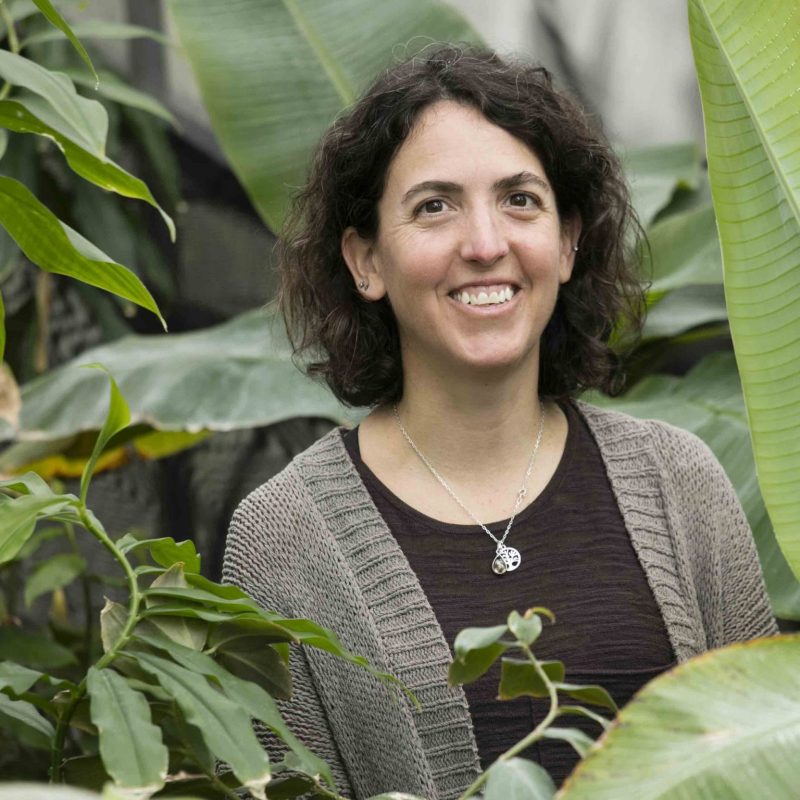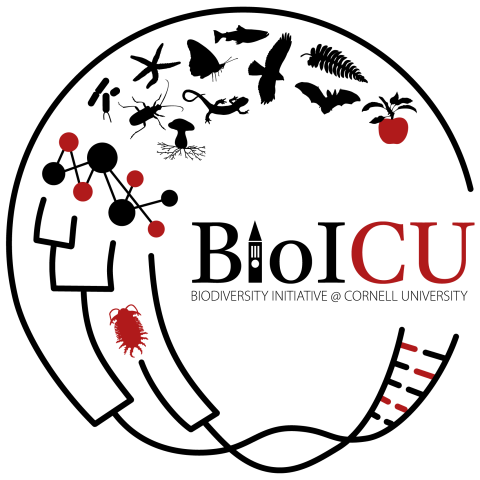People
Participants in the Biodiversity Initiative are members of units from across Cornell, including the School of Integrative Plant Science (SIPS) and the Departments of Natural Resources and the Environment (DNRE), Computational Biology (CompBio), Entomology (Ent), Ecology and Evolutionary Biology (EEB), The College of Business’ Dyson School for Applied Economics (Dyson), the College of Veterinary Medicine (CVM), and the College of Business (COB).

Dr. Chelsea Specht is the Barbara McClintock professor in Plant Biology and Associate Dean of Faculty. Her interest is in patterns and processes leading to the adaptation and diversification of plant lineages, particularly in both temperate and tropical monocots. Her research investigates genetic and genomic signatures of adaptive traits associated with pollination, thermogenesis, and the geophytic lifestyle.

Dr. Matt Hare is Professor in the Department of Natural Resources and the Environment and Director of the Environment and Sustainability program. With training in evolutionary and conservation genetics and a strong connection to field biology, Matt’s research utilizes genetic markers to investigate adaptive processes and characterize evolutionary patterns associated with aquatic population management and restoration.

Dr. Andy Clark is the Jacob Gould Schurman Professor and Nancy and Peter Family Investigator in Molecular Biology and Genetics and the Chair of the Department of Computational Biology. His research focuses on empirical and analytical problems associated with genetic variation in populations. By choosing phenotypes for which there is good information about an underlying gene regulatory network, he asks how genetic variation is manifested at the phenotypic level.

Dr. Philipp Messer is an Associate Professor in Computational Biology. Philipp is interested in a broad range of questions in evolutionary biology and population genetics. A particular focus of his lab lies in studying cases of rapid adaptation that provide the opportunity to observe evolution in real-time and repeatedly. Research in the Messer lab addresses these questions through the development of novel approaches to learn about the process of adaptation and ultimately turn its study into a quantitative and predictive science.

Dr. Kathie Hodge is Professor in the School of Integrative Plant Science and Curator and Director of the Cornell Plant Pathology Collection (CUP). As a mycologist, she focuses on the classification, evolution and characterization of fungi, particularly those causing disease in plants and insects. She uses molecular and morphological approaches to discover relationships, devise classification systems, and understand factors that drive fungal evolution and diversification.

Dr. Patrick O’Grady is Professor and Chair of the Department of Entomology and faculty curator in the Cornell University Insect Collection (CUIC). His research focuses on understanding the patterns and processes that generate and maintain biological diversity in insects, covering a range of biological disciplines including morphology and taxonomy, phylogenetic systematics, population genetics, molecular evolution and genomics. His research group studies various endemic Hawaiian Insects, particularly flies in the family Drosophilidae.

Maria Alejandra Gandolfo Nixon
Dr. Alejandra Gandolfo is Professor in the School of Integrative Plant Science in the section of Plant Biology and Curator of the Cornell University Plant Anatomy Collection (CUPAC). She interested in all aspects of Paleobotany and Plant Anatomy and Morphology. Her research emphasis is on plant evolution and development, origin of angiosperms, Cretaceous and Tertiary floras and paleoclimate of North and South America.

Dr. Irby Lovette is the Fuller Professor of Ornithology in the Department of Ecology and Evolutionary Biology, Director of the Fuller Evolutionary Biology Program at the Cornell Laboratory of Ornithology, and Director of the Cornell University Museum of Vertebrates (CUMV). Research in his lab group centers on using genomic approaches to explore processes of speciation, hybridization, functional genetics, and diversification on a variety of species of birds and avian groups.

Dr. Gary Tabor is a Professor of Practice in the Department of Natural Resources and the Environment, a fellow of the Cornell Atkinson Center for Sustainability, and the Founder and President of the Center for Large Landscape Conservation. As an ecologist and wildlife veternarian, Dr. Tabor is Chair of the IUCN World Commission on Protected Areas’ Connectivity Conservation Specialist Group which connects 1300 scientists across 135 countries. He has worked on behalf of large landscape conservation internationally for over 40 years including 12 years as a conservation funder for Wilburforce, Kendall, Dodge and Kann Rasmussen Foundations.

Dr. Warren Allmon is the Hunter R. Rawlings III Professor of Paleontology in Earth and Atmospheric Sciences and the Director of the Paleontological Research Institution (PRI). Dr. Allmon’s main research interest is macroevolution and paleoecology, especially the origin and maintenance of biological diversity and the application of the geological record to the study of ecological evolution, particularly using Cenozoic marine gastropods.

Dr. Trent Preszler is Professor of Practice and Faculty Fellow for Inclusive Excellence in the Dyson School of Applied Economics in the faculty area of Management and Organizations. With a MS in Agricultural Economics and a PhD in Horticulture from Cornell, Dr. Preszler is developing new undergraduate courses that address global issues of sustainability and inequality in business. These include Forest Bioeconomy, Outdoor Recreation Economy, and Climate-Smart Agribusiness. He also builds world’s most expensive and luxurious canoes and makes wine: A documentary about his life, titled “Winemaker and Boatbuilder,” won the 2017 New York Emmy Award for Best Lifestyle Program.

Dr. Casey Dillman is the Curator of Fishes and Herps at the Cornell University Museum of Vertebrates (CUMV) and is appointed in the Center for Biodiversity Studies at Cornell’s Laboratory of Ornithology. He is interested in many aspects of ichthyology research including evolutionary biology, natural history, phylogenetics, population genetics, and comparative anatomy and engages with Natural History collections using a multi-faceted approach which includes data from genomics, development, and morphology from CT scans and cleared and stained specimens.

Jason is the manager for the Cornell University Insect Collection and the Insect Diagnostic Lab. His main research interest is microlepidoptera with a focus on the taxonomy of the tortricid moth tribe Archipini in the New World. You can find him collecting in various parts of the world or browsing insect collections in efforts to document the Lepidoptera fauna of New York State. He also specializes in leading various public outings and talks on Insects.

Dr. Anurag Agrawal is the James A. Perkins Professor of Environmental Studies in the Department of Ecology and Evolutionary Biology and a member of the National Academy of Sciences. His lab studies the ecology and evolution of plant-insect interactions, including aspects of herbivory, community ecology, phenotypic plasticity, chemical ecology, coevolution, and phylogenetics.

Dr. Christopher Dunn is the Elizabeth Newman Wilds Executive Director of the Cornell Botanic Gardens. He is also adjunct professor in the Section of Horticulture and a faculty fellow in the Cornell Atkinson Center. Dr. Dunn’s professional experience is in plant conservation ecology and in understanding the interdependence between biological and human cultural diversity. As impacts to natural systems are leading to serious erosion of human cultural diversity, his work ensures that conservation and education programs at botanic gardens are used effectively to raise awareness of these connections.


